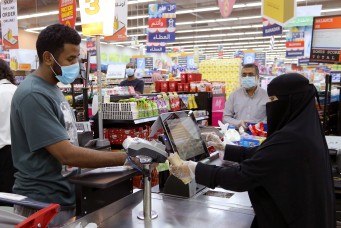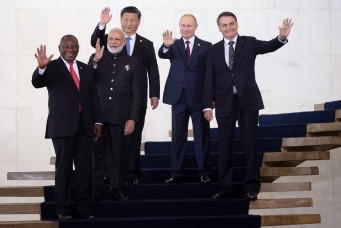Thunderbolt Hitting the Land
An uncertain future looms as Palestine and Israel attempt to mitigate the onslaught of COVID-19.

Palestinian demonstrators argue with Israeli soldiers during a protest against Israeli settlements, amid concerns about the spread of the coronavirus disease (COVID-19) near Nablus in the Israeli-occupied West Bank May 2, 2020. Mohamad Torokman/Reuters
Translation from the Original Arabic Article (published on April 22, 2020)
The coronavirus appeared in Bethlehem on March 5 and the government took immediate measures; many samples were taken for testing, then the entire area of Bethlehem was closed.
On the same day, President Mahmoud Abbas issued a decree declaring a state of emergency for the coming thirty days. Although the nature of the emergency was unclear, a sense of relief prevailed in the country as it appeared that the government was seriously dealing with the pandemic and taking necessary measures.
A Strong Start
The Palestinian government focused largely on measures related to limiting the movement of people, whether by designating Bethlehem and other cities as closed areas or issuing instructions for staying at home. The government almost immediately announced a ban on mass gatherings, including closing schools and universities, a decision that was widely respected—with some exceptions, especially by political parties, such as the prisoners’ release celebration in Jenin. The government was successful in isolating workers coming from abroad and recognizing the need to sometimes test them. The citizenry responded well to these measures, resulting in apparent successes in limiting the pandemic.
A good word on the security apparatuses and their performance is objective and necessary because they have already played a significant role, at times without the necessary personal protective equipment. In general, the Palestinian Authority deserves a high performance score, from the president’s initiative in declaring a state of emergency and dealing seriously with the situation to the government’s measures to curtail human interaction. Other essential areas cannot be assessed positively, however, particularly regarding medical and economic preparedness.
Cracks in the Response
There was a problem in providing basic equipment such as masks, gloves, and protective clothing, especially for health care workers, and in securing extensive testing; appropriate laboratories; and isolation centers (in addition to treatment centers) in new or existing hospitals with needed devices such as ventilators. The lack of preparedness of the Palestinian health system was obvious, and valuable time was wasted which could have been spent on preparations. When steps were taken to obtain what was needed, limited successes were achieved, although it may have been too late as competition among countries for these supplies, specifically medical gear, had intensified.
Furthermore, the economic aspect of the coronavirus seems to have not received full attention. The main problem is the suspension of employment and lack of income for workers and their families, which threatens social cohesion. It is good to try to return workers from Israel, but it is also necessary to provide them with some support so they and other Palestinians who have had to stop working can survive. We have not seen any indication that the Authority has taken on a meaningful role in preventing poverty and suffering.
The second problem is the overall economic situation, particularly the situation of Palestinian small and medium-sized enterprises, where it is evident that the suspension of work has threatened the existence and viability of these productive enterprises. The concept of loan guarantee programs to support these institutions has emerged as a necessity and a step that goes beyond, for example, a support fund. It is important to note that local initiatives undertaken by the youth of the villages, refugee camps, and even some cities, especially from the Fatah movement, were vital in facing the challenges arising from the pandemic, but their greatest importance was in awakening the sense of national responsibility and duty. Israel was not pleased with this development and targeted these initiatives by imposing restrictions on movement.
The Gaza Strip is a different matter. Ironically, its isolation has partially protected the Gaza Strip, in that individuals could not enter from infected areas, which helped to delay the emergence of the pandemic there. However, the de facto authority not only took no necessary measures, but also rejected and resisted the minimal efforts of the Palestinian Authority. Hamas is attempting—as an alternative to rational action and cooperation with the Palestinian Authority—to reach an agreement with Israel to exchange Israeli prisoners for Israeli aid to cope with the pandemic. This will not be easy, and may, God forbid, risk a new military confrontation, although Israel will try to avoid this with bargaining to provide assistance for resisting the pandemic in exchange for its prisoners and the bodies of its dead. The situation in the Gaza Strip is in God’s hands. If the virus spreads, it will be a real disaster, and if it does not, it will be by the great grace of God.
On April 3, President Abbas appeared in a short, televised statement to announce his decision to extend the state of emergency for an additional thirty days.
As we approach mid-May, debate continues to intensify over the need to restore economic life, even partially, especially as it appears that the virus has slowed. Also, as Ramadan has arrived, people need money during the Holy Month more than at any other time. If the government’s resources are insufficient to alleviate the hardship, I think this is a time for sharing the burden, for solidarity and fraternity among people.
Israel must be pressured to follow the international standard of responsibility to protect prisoners. It may not be possible to achieve large-scale releases, but I think it is possible to achieve the release of the most vulnerable, especially women, children, the elderly, those with underlying medical conditions, and perhaps those who have served the greater part of their sentences.
Coronavirus in Israel
In general, Israel was late in taking the necessary measures to limit people’s movement. Israel has identified the economic sectors that require Palestinian labor and allowed workers in these sectors to remain for three months in Israel under the responsibility of their employers, despite the Israeli state’s declaration that it will not permit the movement of workers between Israel and the Palestinian territories. This situation is a characterization of the usual Israeli opportunism, but it has not stopped there. Israeli authorities have thrown any Palestinian worker with symptoms of infection out of the country from the nearest checkpoint, creating a major problem for the Palestinian side.
Israel has many challenges of a strategic nature that are exacerbated by the virus. First of all, the Israelis face an internal political crisis, which was manifested in serious political dissent, even after three elections. Some even suggest that real confrontations could erupt among differing Israeli factions.
The second issue Israel is dealing with in the midst of the COVID-19 crisis is the behavior of Israeli religious extremists and their failure to adhere to the instructions for social distancing and their insistence on maintaining their normal pattern of behavior, which has undoubtedly contributed to the spread of the virus.
Thirdly, the neglect of Palestinians in Israel, especially in certain areas, may lead to a spread of the coronavirus which would ultimately be a major problem for all of Israel. The role of the Israeli settlers and the proliferation of settlements among the Palestinians, including the situation in Jerusalem and its demographic composition, particularly in occupied East Jerusalem has all led to Israeli policies which are aimed at swallowing Palestinian land. This directly contradicts the policies needed to combat the virus.
Israel clearly cannot afford the collapse of the PA during this pandemic, and at the same time cannot allow the Authority to take wrong actions. Consequently, Israel is obliged to either unilaterally impose decisions on the Palestinian side or to accept consultation and joint work with a degree of parity. The problem with all this is that the Palestinian side seems unable to understand the equation: what matters is not who possesses more weapons or money, but rather who acts more responsibly. The coronavirus was a rare opportunity for the Palestinian side to impose parity of treatment while acting responsibly toward its people. Unfortunately, this did not happen.
What will actually happen because of the coronavirus, this thunderbolt hitting our country, will be impossible to know right now. Might the global pandemic contribute to the same expansionist policies in the era of the pandemic, and how will Israeli society, or at least the ruling powers, change?
These questions are still unanswered. Our duty is to prepare fully for the worst and to adopt policies and measures that enhance our ability to resist and render the Israeli project unworkable because otherwise, the COVID-19 pandemic will enable Israel to impose an exceptional state of vulnerability and even dependency on the Palestinian side.
Nasser Alkidwa is former foreign affairs minister of Palestine. In 2012, he was appointed as Deputy Joint Special Envoy of the United Nations and the League of Arab States on Syria. Alkidwa held various other notable positions, including the Arab League’s Special Envoy to Libya, and Permanent Observer of Palestine to the United Nations from 1991 through 2005. He is currently the chairman of the Board of Directors of the Yasser Arafat Foundation and member of the Central Committee of Fatah.
Read More



